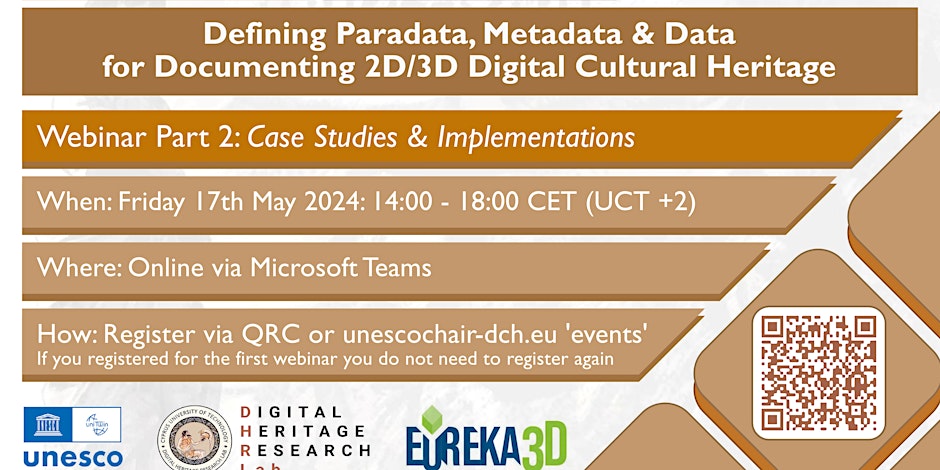part II - Paradata, Metadata & Data in 2D/3D Digital Heritage Documentation

This webinar in two parts brought together professionals from the spectrum of Digital Cultural Heritage practice to share their experiences of using and working with paradata seeking to lay down a common understanding of paradata as a first step towards a community-built set of standards and expectations for its application to 3D documentation and the creation of knowledge.
Organized by UNESCO Chair on Digital Cultural Heritage at Cyprus University of Technology in collaboration with EUreka3D, this webinar discussed the most advanced requirements and cases of the use of Paradata and Metadata in the digital documentation of the Past in 3D, for enriching 3D assets, creating knowledge and promoting reusability.
The webinar was addressed to the Digital Cultural Heritage community to establish a definitive description and differentiation of what paradata and metadata are, and the benefits they are bringing to the stakeholders, owners, multidisciplinary community and digital scholarship, as well as to the European Commission.
Agenda - Please note times are in CET
- 13:30-14:00 Join the session using your MS Teams Link
- 14:00-14:10 Robert Davies Chairman, Europeana Network Association, NL Opening remarks
- 14:10-14:20 Marinos Ioannides, et al UNESCO Chair on DCH, CUT, CY Paradata, Metadata & Data for a Digital #MemoryTwin
- 14:20-14:35 Marc Grellert, et al TU Darmstadt, DE The DFG-Project IDOVIR - Infrastructure To Document Paradata Of Virtual Reconstructions
- 14:35-14:50 Elisabetta C. Giovannini, et al POLITO, IT Extending the Extended Matrix With CIDOC-CRM. Paradata for Virtual Reconstruction Processes & Beyond
- 14:50-15:05 Chiara Parisi , et al UNIFE, IT Paradata as a Strategy for a Systematic Digitization of Museum Objects
- 15:05-15:20 Matthieu Quantin, et al University of Nantes, FR Publishing & Long-Term Archiving 3D Data in Humanities - French 3D Consortium Proposal
- 15:20-15:35 Marion Depraetere Museum für Naturkunde – Leibniz Institute for Evolution and Biodiversity Science, DE Virtual Access to Fossil & Archival Material From the German Tendaguru Expedition (1909-1913)
- 15.35-15:50 Yashaswini Jayadevaiah Indian Institute of Technology Kanpur, IN ‘Translation' as a Practice-Ontology to Script All Data: A Case Discussion
- 15:50-16:05 Morris Murphy TU Dublin, IE A Paradata Framework for HBIM
- 16:20-16:35 Sonia Giovinazzi National Agency for New Technologies, Energy R Sustainable Economic Development, IT Integrated Paradata-Metadata-3D Models for Enhancing the Resilience of Cultural Heritage Buildings to Climate Changes & Other Natural Hazards
- 16:35-16:50 Wanda Listiani Institut Seni Budaya Indonesia Bandung, ID Photogrammetry Paradata in the Three-Dimensional Documentation of Pawon Ancient Humans in Indonesia
- 16:50-17:05 Carlos H. Marcondes Federal University of Minas Gerais, BR Heritage Objects & Patrimonialization: Documentation of a Curatorial Process
- 17:05-17:20 Pedro Luengo et al Universidad de Sevilla, ES Toward a Trustable Digitisation of Built Heritage: The Role of Paradata
- 17:20-17:35 Antonio Suazo Navia Pontifical Catholic University of Chile, CL Virtual Urban Reconstruction Based on Photographic Sources: Knowledge Management and Paradata as a "Chain of Visual Evidence"
- 17:35-18:00 Igor Bajena Hochschule Mainz University of Applied Sciences, DE European CoVHer Project in the Context of Developed Methods for the Documentation of Hypothetical Digital Reconstructions of Lost Architectural Heritage in Higher Education
- 17.50 - 18.20 Discussion Session & Closing Remarks
>>> AGENDA IN PDF (300 KB)
|
